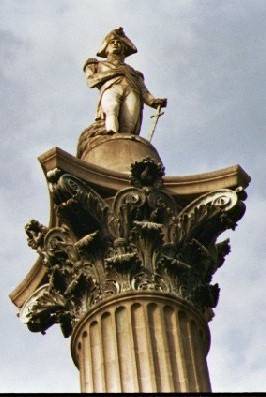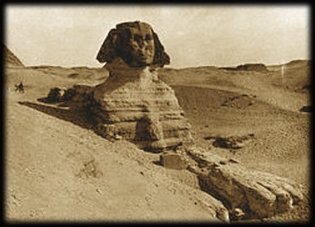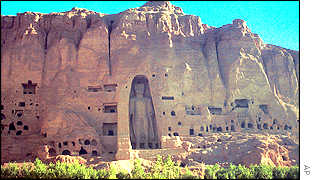We Should NOT Worship
The False Gods of the Mundane World
last updated 20th January 2006
Below on this page you will find some different perspectives to help us
understand better the process of iconography, and how it is different from
idolatry, etc. That also there is One True God, and He does not have an
equal or competitor, He is Supreme. There are no limitations to God, and
He can appear in any place to anyone, in anyway He sees fit to do so.
The safe-guards found in the teachings of various peoples who hold The
Faith, such as the Bible and the Koran (Quaran) that specifically talk
of man made speculations, and concocted images, or images of persons or
things that are not Him.
Please view our Ontology
according to Srila Vyaasa
Tirtha, this puts everything nicely in its place, and clears up any
confusion.
Please continue on down the page to view more information on the above
topic - False Gods.
THE TEN COMMANDMENTS Ex. 20: 2-17
The First Commandment
"I Am the Lord your GodÖ..you shall have no other gods before
me."
God here identifies himself as the great I AM.
He tells us we must not look to any other being who might raise himself
up as a god, e.g. Satan; or any myth such as the gods of Olympus.
The Second Commandment
"You shall make no graven image or any likeness of anything in heaven
or earth, nor bow down to any such thing." This is derived from the first
commandment and leaves no doubt about what God thinks of false idols.
We too, agree that one should not accept anyone as God other than that
Supreme Person Who is totally Independent of all other lesser beings of
these worlds. There is only One such being, but just like the Sun in the
sky, He is known in different places, at different times, by different
peoples, by different names. (See names of
God page HERE)
The Third Commandment
"You shall not take the name of the Lord your God in vain."
They say,
"This too is derived from and is an extension of, the first commandment.
It commands respect for Godís name, and lets us know what peril a society
is in which uses His name as a curse and as an expletive."
The Fourth Commandment
"Remember the Sabbath day, to keep it holy. Six days you shall labour
and do all your work, but the seventh day is a day of rest."
They say,
"This, and all the following commandments, is a part of the second primary
commandment to love our neighbours as ourselves. Everyone is to have a
day off at least once a week. The Sabbath is made for man and not man for
the Sabbath. It is wrong to force our employees to work on the Sabbath."
This means that the concept of 100% dedication to God, and the culture
of God consciousness has been replaced by Social and economic ideals based
on sense gratification.
The Fifth Commandment
"Honour your father and mother, that your days may be long in the land."
If each generation honours their parents and cares for them as for themselves,
then each generation will be respected and cared for in their old age.
Alas now we see "Rest Homes" and euthanasia as a seeming solution to an
unwanted older generation, that have lost their focus due to the over emphasis
on sense gratification and little direction toward spiritual persist.
The Sixth Commandment
"You shall not kill" now been changed to "You shall not murder."
They now say, "Murder is not the same as killing and the distinction
has in past times been clear to most people. Now, however, we have so perverted
our language and our laws that the difference has been blurred to the extent
that it has become legal to murder babies in the womb. In terms of the
primary commandment to love my neighbour as myself, I am guilty of murder
if I do not stop a murderer from slaying innocents and the helpless. If
society has to kill the murderer to stop him then that is lawfully killing
him. It is not murder. A war of defense is not breaking the sixth commandment."
The careful wording still doesn't detract from as mentioned above the
innocent being killed. Not just innocent babies in the womb but millions
of innocent animals each year. See more on this on our Vegetarianism
and Beyond page.
The Seventh Commandment
"You shall not commit adultery."
Adultery leads to such devastation of families, to such despair and
pain for all, and especially for children, that it must rank as one of
the worst crimes against our neighbour.
Cont.
And yet in these latter days it is the norm. It has become so commonplace
that those who donít do this are thought rather strange.
The Eighth Commandment
"You shall not steal."
Theft is commonplace even among misguided Christians. Stealing from
the boss is regarded as a perk of the job. Violating copyright is claimed
as a right and not seen as stealing the property of another. Politicians
selling off the assets of a nation do not see that they are stealing the
birthright of its citizens. All theft degrades integrity.
The Ninth Commandment
"You shall not bear false witness against your neighbour."
A personís good name is a priceless asset. To bear false witness is
therefore a grievous crime. Creating false evidence to convict a criminal
is every bit as evil as his crime.
The Tenth Commandment
"You shall not covet anything which is your neighbours."
Coveting leads to envy, which is the original cause of our suffering(s)
as separate enjoyers in this mundane world, it leads us to false proprietorship
through theft, dissatisfaction, adultery and to gain what one wants even
murder.
The Mosaic Law http://www.threegraces.com/AboveTheDoubleBind/mosaic10.htm
The Tenth Commandment - Exodus 20:17
Thou shalt not covet thy neighbour's house, thou shalt not covet they neighbour's
wife, nor his manservant, nor his maidservant, nor his ox, nor his ass,
nor any thing that is thy neighbour's.
"The Tenth Commandment reveals how clearly woman was conceived under
the rubric of property." (The Story of Civilization, Durant, Chapter XII,
p. 339.)
To Covet:
To desire inordinately; to desire that which it is unlawful to obtain or
possess; in a bad sense. (Webster's 1828 Dictionary.)
In theocracy all things belong to Yahwah; He is the "giver" of all things.
It is unlawful to covet any thing not already "given" and allotted by Yahwah.
----------------------------
The Cause of "Covetousness"
The Tenth Commandment is closely aligned with the First, "Thou shalt
have no other gods before me," and the Second which is an extension of
the First: "Thou shalt not make unto thee any graven image, or any likeness
of any thing that is in heaven above, or that is in the earth beneath,
or that is in the water under the earth: Thou shalt not bow down thyself
to them, nor serve them: ..." In other words, thou shalt not covet any
other gods or any thing which Yahwah has created, nor any thing thy hands
have created. One's heart, mind, body and the fruit of one's labor ...
all belong to Yahwah; "coveting" one's own self and property is unlawful
and punishable by destruction, for Yahwah is a jealous God ... vigilant
in guarding His possessions. Yahwah's "jealousy" in the First Commandment
is the cause of mankind's "covetousness" in the Last Commandment; deprivation
causes desperation.
Since Yahwah created every thing that exists out of Himself alone and
every thing was to return to Him as His very own, the Tenth Commandment
could be seen as a reinforcement of the First Commandment after having
been "tested" by the intervening double bind Commandments. By Stage 10
the possibility of an individual no longer exists; there is a total destruction
of Self-Identity re-absorbed into the mind of Yahwah.
Jealousy - Pride - Covetousness
Yahwah causes the problem, then condemns the effect.
To "covet" is akin to taking "pride" in ones own creative efforts, which
requires a Self; both are jealously labeled by Yahwah as "false idols"...
to take pride in what one can create as an individual but which is made
unlawful by a jealous Yahwah. There is nothing to covet from a neighbor
if one is free and can own and take pride in one's own self and creativity.
It is the hungry and starving person who "covets" and steals his neighbor's
"bread." The Binder first creates the "hunger," secondly blames the Bound
for being hungry, and thirdly steps in to "save" the "sinner" from his/herself
by the same means ... more self-sacrifice. It is a circular, repeating
pattern of no-win.
It is ironic that Yahwah "freed" the Israelites from bondage, as slaves
to Pharaoh, to become slaves bound to Him, and then allowed the Israelites,
in turn, to take slaves for themselves.
The Shared Meanings of the Words, Covenant and Covet.
There is a connection between these two words and the First and the
Last Commandments. The First is a covenant with Yahwah that there should
be no earthly "gods" or "goddesses" existing before Him; the Last is that
one should not covet (desire to own for oneself) any tangible (animate,
or inanimate) "thing" for this would allow pride to develop should one
actually own one's own creativity and Self which would lead to the danger
of worshipping "false idols," i.e., "false gods."
This fits the scripture: "...there are last ("false gods") which shall
be first, and there are first (earthly Gods and Goddesses) which shall
be last." The use of the Pattern reverses and turns upside-down everything
through the loss of personal identity. Being deprived of ownership of the
human self and personal creativity causes a hunger that needs to be satisfied,
which is then labeled as "aggression," i.e., "covetousness" ... which is
a projection from the Binder-Thief who jealously guards His plunder. Possession
equates to "ownership."
-----------------------------
The Shared Meanings of the Words, Covenant and Covet.
There is a connection between these two words and the First and the
Last Commandments. The First is a covenant with Yahwah that there should
be no earthly "gods" or "goddesses" existing before Him; the Last is that
one should not covet (desire to own for oneself) any tangible (animate,
or inanimate) "thing" for this would allow pride to develop should one
actually own one's own creativity and Self which would lead to the danger
of worshipping "false idols," i.e., "false gods."
This fits the scripture: "...there are last ("false gods") which shall
be first, and there are first (earthly Gods and Goddesses) which shall
be last." The use of the Pattern reverses and turns upside-down everything
through the loss of personal identity. Being deprived of ownership of the
human self and personal creativity causes a hunger that needs to be satisfied,
which is then labeled as "aggression," i.e., "covetousness" ... which is
a projection from the Binder-Thief who jealously guards His plunder. Possession
equates to "ownership."
---------------------------------
False Gods and Covetousness in Theocratic Mormonism
President Spencer W. Kimball: "The False Gods We Worship," June 1976
("Yes,") "The Lord (Yahwah) gave us a choice world ....
("But,") ... expects righteousness and obedience to his commandments
in return. When I review the performance of this people in comparison with
what is expected, I am appalled and frightened. Iniquity seems to abound.
The Destroyer seems to be taking full advantage of the time remaining to
him in this, the great day of his power. Evil seems about to engulf us
like a great wave, and we feel that truly we are living in conditions similar
to those in the days of Noah before the flood."
.... "These have submitted themselves in one degree or another to the
enticings of Satan and his servants and joined with those of "the world"
in lives of ever-deepening idolatry."
What Yahwah Says and What Yahwah Does.
Kimball(Continues): "Therefore, in all ages when men have fallen under
the power of Satan ("flesh") and lost the faith (i.e., have use of their
own powers of reason), they have put in its place a hope in the "arm of
flesh" and in "gods of silver, and gold, of brass, iron, wood and stone,
which see not, nor hear, nor know" (Dan. 5:23) -- that is, in idols."
The Irony of Yahwah's Theft of Personal Property
Yahwah, through Daniel, turns his children into non-human figures by the
use of the first three Commandments which takes away, through fear, their
ability "to see," "to hear," and "to know." Yahwah turns his children into
"things," then condemns them for reflecting the values He instilled in
them, that of "gods of silver, and gold, of brass, iron, wood and stone,
which see not, nor hear, nor know."
(See essay above; Summary of 1st, 2nd, and 3rd Commandments.)
Although the disenfranchised are not to desire silver, gold, brass,
iron, wood and stone for themselves (making them idols) Yahwah orders his
obedient servants to invade and conquer lands, kill all inhabitants, then
plunder all gold, silver and other precious things to be put into His Temple.
This is likewise true of "pride;" pride in being the best at plundering,
lying, etc., because it is done with "Yahwah's Sanction."
The Dominant Theme in The Old Testament
Kimball: "Placing "a hope in the 'arm of flesh,' -- that is, in idols
... This I find to be a dominant theme in the Old Testament. Whatever thing
a man sets his heart and his trust in most is his god; and if his god doesn't
also happen to be the true and living God of Israel (Yahwah), that man
is laboring in idolatry."
Again, the human being is dehumanized into a non-entity, then filled
with the "spirit" of Yahwah whom he idolizes, becomes as Yahwah is in thought
and action, in short, a zealot. All the "Thou Shalt Nots" he formerly could
not do, under pain of death and destruction, he is allowed to do by being
One with Yahwah in all things.
"Thou Shalt Not Covet"
Kimball:"... I recently learned an interesting fact: If a man owns a million
dollars worth of gold at today's prices, he possesses approximately one
27-billionth of all the gold that is present in the earth's thin crust
alone. This is an amount so small in proportion as to be inconceivable
to the mind of man. But there is more to this. The Lord who created and
has power over all the earth created many other earths as well, even "worlds
without number;" and when this man received the oath and covenant of the
priesthood, he received a promise from the Lord of "all that my Father
hath." To set aside all these great promises in favor of a chest of gold
and a sense of carnal security is a mistake in perspective of colossal
proportions. To think that he has settled for so little is a saddening
and pitiful prospect indeed; souls of men are far more precious than this."
(Note: Ironically, the coffers of the Mormon church are full; they are
second only to the Catholic church in amounts of revenues from tithing
and returns on tithing investments. This "carnal security" is "justified"
because it is Yahwah's money, i.e., it is not of "carnal man.")
The human individual must not covet anything in this earthly life what
you are promised in the next life; you will have all the gold you could
ever want in the "many other earths" that you will receive, but don't think
of this as being covetous of what you will receive in the next "world."
Mormonism says the only thing necessary to obtain what you now postpone
to own in this life, is to obediently sacrifice your humanity here ...
for the great promises of the next life. Your "soul" which belongs to Yahwah
will be "saved" in Him; therefore, being One, you have the promise that
all that He has will be yours also ... IF ... at Judgment Day ... there
are no "Yes, buts" to put you back at the end of the waiting line.
The precious "souls" (hearts and minds) of men and women are the self-identities
that must completely, and "perfectly" die in order to be "saved" for a
selfless "life" in/with Yahwah. Nothing will have changed; all "possessions"
would be held in common; there would be no personal identities that could
claim ownership; the means will have been taken away.
http://www.threegraces.com/AboveTheDoubleBind/mosaic10.htm
Here are some arguments that the modern day Christians present to support
their views on idolatry. There are some interesting comments from the author,
but what strikes me most is the strong sense of rejection based on their
love for the Lord of anything or anyone lesser trying to replace or imitate
God as portrayed in the Old Testament of the Bible, and similarly of the
books of Islam. http://members.truepath.com/cherub7/idols.html
99.9% of the presentation
I agree with, and as stated one should be very careful to not accept any
speculative form or likeness as being The Supreme Personality of Godhead,
Who by His grace has appeared to numerous devotees in as many places revealing
various aspects of His Divine Nature.
Some False Gods........

Mickey Mouse worship.......

Superman

Statue of Liberty - US icon


Nelson at Trafalgar Square London - a regular place of worship for
pigeons

Lenin
Click HERE
to better understand worship in the three modes of nature.
Worship of God is nit under those, but is rather situated in Pure Goodness.
Here's another interesting article:
In "Hudson's Statue," Carlyle questions the populace's authority to
vote and the subsequent legitimacy of the elected leaders with bitter sarcasm:
"Are these your. . . Great Men?" He answers for them that these leaders
elected by the people are "worthy of no worship," thereby accusing the
people of idolatry. They have put their faith in leaders who do not deserve
worship. Read more from this article HERE:

http://mujweb.atlas.cz/Cestovani/Egypt/sfinga.htm
The essential difference between idolic statues poised as "gods" as
depicted in the following site here http://mujweb.atlas.cz/Cestovani/Egypt/statues.htm
and the Archa-vighraha as in the Deity form honoured in temples and shrines
around the world is clearly stated in some of the Articles at the link
HERE.
These articles will reveal the differences between idols, statues, etc.,
and the devotion needed to see God in His various forms as and when He
appears. The picture below while being decorative, neither has Bhakti (devotional
love) nor the presence of the nature of Icons (Deities - Shilas) found
in the pages of this site from temples, altars and shrines around the world.
Statues as in the Vatican from the Roman Empire

http://bellarmine.lmu.edu/faculty/fjust/Asclepius.htm

http://news.bbc.co.uk/hi/english/world/south_asia/newsid_1197000/1197900.stm
What happens when fanaticism takes on the face of iconoclasm. See our
article on the Black Stone of Islam - the Kaaba.
Here we make an attempt to reveal similarities in Islamic views and Vedik
views, and to glorify the One True God, and His representative(s) in agreeance
with God's teachings.
Real Icons or Idols

















